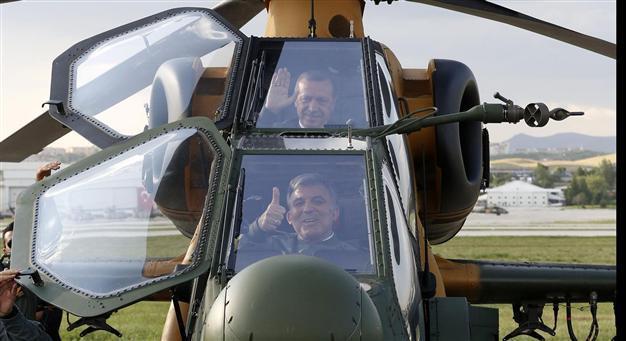PM Erdoğan rules out President Gül’s immediate return to AKP
ANKARA

Intimations that he and Gül are fighting over each other’s political career are 'fabricated,' Erdoğan said.
Any return by President Abdullah Gül to the Justice and Development Party (AKP) as party chairman will have to wait at least 10 months, Turkey’s prime minister has said, strongly implying that he does not regard his longtime friend as a potential premier if he is elected president next month.
“The most [important] period for us is the interim period. This interim period will take 10 months. In the case of our president’s wish to return to politics after these 10 months, nobody inside the AK Party would object to this. This can’t be possible,” Erdoğan said in a televised interview with ATV late July 21.
With the ruling party largely confident that Erdoğan will win the presidential elections in the first round, all eyes have now turned to the next prime minister of the AKP. Although some senior AKP officials have strongly voiced their hope of seeing Gül become leader of the party, relatively newer members have hinted their objection to his return. There are reports that there is already an internal disagreement on the issue.
Erdoğan said intimations that he and Gül were fighting over each other’s political career were fabricated by those who do not know the personal relations between the two, adding that putting personal goals before the party would jeopardize the AKP.
“I have discussed all of these issues from A to Z with our president,” he said, adding that he could return to politics after the completion of the interim period. “But I find it wrong that some would provoke [Gül’s return] in this interim period.”
The interim period would stretch between Erdoğan’s prospective election as president and the realization of the parliamentary elections in June 2015. In between, the party must hold its general convention to elect the next chairman, probably in October. Erdoğan ruled out that the party chairman and the prime minister would be different figures. “We have not found our party on the ground of ‘I’ but ‘We.’ And that’s how we could be successful.”
‘I’ll select the prime minister after consultations’“Our sole objective is to win the presidential elections. After winning the elections, the president will surely have his own decision. But it should be known that this president will not move in an egocentric way,” he said.
If elected as president on Aug. 10 or in a second round on Aug. 24, Erdoğan will have to choose a prime minister from his parliamentary group to form the next government. “If this job is given to us by the people, then we’ll make our consultations and then decide on one of the options already in our minds. But my method is very important; we’ll conduct public opinion polls [to select the prime minister],” he said.
Erdoğan also ruled out bringing general elections forward to late 2014, saying: “I am curious as to why holding early elections is being mentioned. Early elections would put the country in jeopardy.”
Recalling that the government should approve the 2015 budget so that it will be more comfortable on the eve of parliamentary elections, he said: “There is no coalition government but a full-fledged government. A new prime minister will be appointed to this government.”
Erdoğan also said a new PM could reshuffle the Cabinet and take the government to the 2015 elections.
Strong president, strong prime ministerErdoğan gave more clues on his potential relation with the next prime minister, dismissing claims that he would weaken the head of the Cabinet as he will act as the head of the executive.
“Our system is neither presidential nor semi-presidential. In these systems, only the presidents are powerful. Here the prime minister has certain authorities. We can’t ignore them. The only difference is that I will be elected as the president through a popular vote,” he said.
“I will not of course weaken my friend who will be elected as the prime minister. And he is an elected prime minister. We will walk hand in hand,” he said. “No one should get concerned. We will walk together; I will run, he will run.”
Erdoğan, however, strongly emphasized that the next prime minister should continue to fight against the “parallel state” along with the president. “If we do not pursue this fight together; then our friends in the executive will pay the price for it. We went through this and I do not want to experience this again.”
The parallel state refers to the movement of Islamic scholar Fethullah Gülen, an erstwhile ally of Erdoğan until the pair fell out last year, particularly after Gülenist elements within the police and judiciary launched a graft probe against members of the government.
No Putin model When reminded that Russian President Vladimir Putin has excessive powers to run his country, Erdoğan said the Russian example was unique and that “I have no such a desire. Our consideration is Article 104 of the Turkish Constitution. If we can get a majority to amend the Constitution in the 2015 elections, then we would bring a new Constitution to the agenda. Our objectives are well-known.”
Erdoğan has made no secret of his desire to amend the charter to pave the way for the adoption of a presidential or semi-presidential system.
